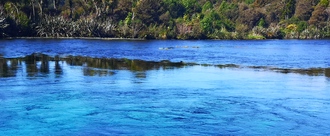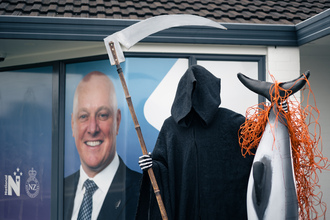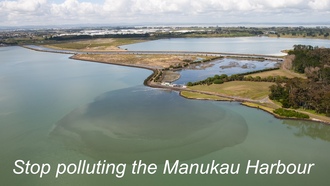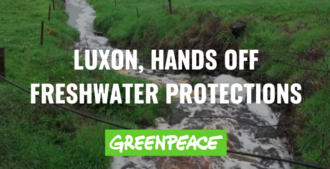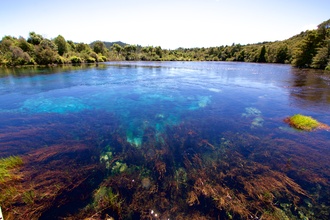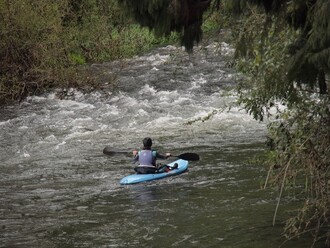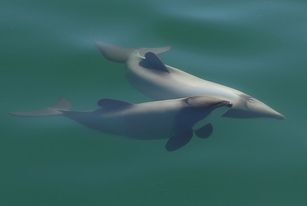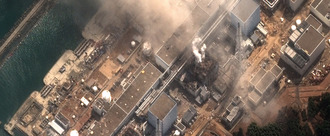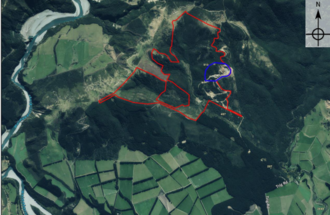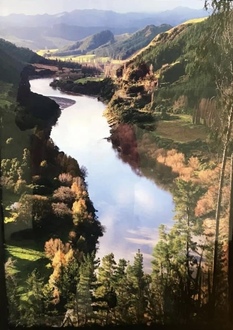-
Save Our Water Conservation OrdersTe Waikoropupū Springs have some of the clearest water ever measured on earth. In 2023, the Springs were protected by a Water Conservation Order (WCO). The WCO gives a special cloak of protection that councils must abide by when considering resource consents. In late 2025, the Government plans to replace the Resource Management Act (RMA). Federated Farmers is asking the Minister to remove the Te Waikoropupū Springs WCO and all WCOs from the future resource management system. If this were to happen, Te Waikoropupū Springs would be at significant risk from pollution. Te Waikoropupū Springs would also lose the protection the WCO gives if resource consents are sought for mining at Sams Creek. All other precious waterways which are protected by WCOs, would also be similarly at risk. It’s time to draw the line and protect our most precious and endangered waterways. Sign our urgent petition to protect all Water Conservation Orders! Water conservation orders | Ministry for the Environment (Includes Te Waikoropupū Springs) Maps: Te Waikoropupū Springs Short video includes: Sams Creek and Te Waikoropupū Springs https://www.youtube.com/watch?v=mgxfTNztNVk3,627 of 4,000 SignaturesCreated by Kevin Moran
-
Protect Hector's from the fishing industryNo dolphin should be drowned in a net. Yet since Christopher Luxon has been Prime Minister, at least 15 Hector's dolphins have been killed by the fishing industry. They include a mother and calf pair, juvenile dolphins and adults, with almost all of them around Canterbury. Māui and Hector's used to be the most abundant dolphins around NZ's coastal waters. Now they are among the world's rarest. PM Luxon must protect Hector's from the fishing industry. Be a Dolphin Defender and help stop extinction. Links Stuff Luxon office protestors say at least 15 Hector’s dolphins killed since he was PM The Press, Andrea Vance Dolphin protest targets PM Luxon’s office Stuff Fisheries Minister rejects dolphin protestors claims TV3 The Grim Reaper visits Botany from 4.34 Stuff poll Our wrap video Our Givealittle page3,309 of 4,000 SignaturesCreated by Christine Rose
-
Stop polluting the Manukau HarbourThe Manukau Harbour is a taonga of Auckland, a vital ecological and cultural asset with huge potential for eco-tourism and recreational use. Yet the Manukau has long been abused as a dumping ground for Auckland’s waste, from landfill reclamations to industrial waste discharges. Currently and inappropriately, our Council uses the Manukau for the discharge of Auckland’s treated wastewater effluent. The shallow and predominantly closed nature of the harbour inhibits the natural flushing of contaminants, resulting in prolonged exposure to pollutants. It is time for this practice to cease, and the mana of the Manukau Harbour be restored. For a start we want Auckland Council to acknowledge the significant harm caused to the Manukau Harbour and its tributaries by the discharge of treated and partially treated wastewater. The Māngere Treatment Plant is the largest freshwater tributary to the Manukau Harbour. Its discharges, and other treatment plant discharges, are severely damaging to this predominantly closed salt water environment. Soon this damage will increase due to higher volumes of treated effluent expected once the Central Interceptor (CI), comes online. Our petition is urging the Government to change the legislation to direct Auckland Council and Watercare to take the necessary steps to ensure Manukau Harbour is free of waste water discharges. Even when treated, wastewater pollution endangers marine life and encourages invasive weeds to smother the sea bed. This pollution leads to eutrophication and habitat degradation, causing significant harm to marine life and ecosystem health. Discharges have resulted in our beaches being closed due to levels of E-coli and other bacteria reaching unhealthy levels for humans to swim in. Contaminated water in the Manukau Harbour presents serious risks to public health. The value of this harbour is diminished due to the negative perceptions caused by continued wastewater pollution. Consents to discharge wastewater into the Manukau have in the past been set with long durations and automatically renewed. We believe it’s time that existing and future discharge consents be limited and alternative solutions need to be put in place so that future discharges to the Manukau Harbour and its tributaries cease to be needed. Action on this is needed now by way of legislative change that enforces the desired outcomes on Auckland Council and its Council Controlled Organisation Watercare, or any other such organisation in the future. By updating the legislation the Government can direct and support Auckland Council and Watercare to: 1. plan for future methods of discharge management so that discharge consents into the Manukau Harbour and its tributaries cease to be needed once current consents lapse. 2. restrict renewed discharge consents from permitting discharges into the Manukau Harbour and its tributaries after a period of 10 years from the date this condition is ratified (allowing Auckland Council and Watercare adequate time to devise and implement alternative solutions). 3. disallow granting of new discharge consents into the Manukau Harbour and its tributaries (excluding renewal consents as conditioned under 1.b). 4. disallow redirection of discharges to other consented outflows into the Manukau Harbour and its tributaries. 5. identify and remove all indirect sewage discharge points into the Manukau Harbour and its tributaries, such as those by weir diversion from combined rain and sewer pipes, within 15 years from the date this condition is ratified. Auckland Council and Watercare need to list options for replacement of discharges into the Manukau Harbour, along with conditions associated with these options (including full public consultation before adoption). Suggested options include: 1. A direct pipeline to discharge into the Tasman Sea at a distance from the foreshore that prevents discharged water from returning to the beaches along the West Coast, and of a quality of discharge that meets defined standards for discharges into the sea (to be defined). 2. Irrigation of farmland (must apply only to land that is away from watercourses that enter the Manukau Harbour and its tributaries). 3. Reticulation through industrial grey water uses and back for retreatment, such as to be used for industrial processes at Glenbrook Steel Mill. 4. Piped to reservoirs such as the Waitakere or Hunua Reservoirs for reprocessing into Auckland’s water supply. 5. Purified to a standard acceptable for drinking water and reused as part of Auckland’s water supply 6. Processed through a man made wetland development in line with the City of Arcata, Arcata Marsh Wildlife Sanctuary, with appropriate management and monitoring plans in place. 7. Other options that need to be approved. Let’s work towards a future where it is safe for families to swim in the Manukau harbour. Please sign our petition and protect the Manukau Harbour for future generations! Support for this petition This petition is raised on behalf of the following organisation and undersigned signatories • The Manukau Harbour Restoration Society (MHRS) • Weymouth Residents and Ratepayers Association • Stop Polluting the Manukau Harbour Incorporated (SPTMH) • The Onehunga Enhancement Society (TOES) • Aotea Sea Scout Group • Clarks Beach and Waiau Pa Residents Association • Te Ākitai Waiohua Waka Taua Incorporated The intent of the petition is also supported by Te Kawerau ā Maki, iwi of the northern Manukau.184 of 200 SignaturesCreated by Manukau Harbour Restoration Society
-
Hands off the water protectionsEveryone has a right to know that the water coming out of their kitchen tap is safe to drink. We should all be able to take a dip in our local river without getting sick. But across Aotearoa, the health of lakes, rivers, and drinking water is worsening – and one of the worst contaminants is nitrate, coming from the intensive dairy industry. Now Christopher Luxon’s government plans to get rid of the only freshwater protections in New Zealand. They want to see more cows living in mud, polluting rivers with more sediment and cow effluent. And they’re removing Te Mana o Te Wai – a policy that puts the health of freshwater ecosystems first, the health of people second, and commercial use of water last. They are giving commercial interests free reign to pollute with no regard for the health of nature or people. This will put rural communities across the country, as well as entire cities like Christchurch, at risk of unsafe levels of nitrate contamination in their drinking water. And it will lead to more unswimmable lakes and rivers. New Zealanders may have voted for a change of Government, but they did not vote for unsafe drinking water. They didn’t vote for lakes and rivers to be treated like open sewers. For the sake of all New Zealanders, Luxon must keep his hands off the freshwater protections. Release: Government repeal of Te Mana o Te Wai condemning rural communities to unsafe drinking water, Greenpeace26,433 of 30,000 SignaturesCreated by Greenpeace Aotearoa

-
Don't fast track Te Waikoropupū!⭐️ We delivered this petition in July 2024. While Siren Gold Mining was not on the first list of fast track projects they are still planning to go ahead with their mining of Sam's Creek. You can sign the petition to stay in touch and support the campaign. ⭐️ Te Waikoropupū Springs have some of the clearest water ever measured on earth. Last year the Springs received a Water Conservation Order (WCO) from the Environment Court. The WCO gives a special cloak of protection that which councils must abide by when considering resource consents. Yet if the Fast Track Approvals Bill were to pass into law the way it is written, the Government would be able to bypass the protections the WCO gives Te Waikoropupū Springs. We have also become aware that Siren Gold Mining has been invited to fast track an application to mine in the Golden Bay area under Sam’s Creek. Sam’s Creek Mine is essentially an arsenic mine. Up to eleven million tonnes of arsenic-laden rock will be mined. The processing of the rock will most likely happen at a plant to be developed on farmland in the Upper Takaka Valley. Arsenic-laden rock will be pounded to a fine powder and passed into a slime heap containing cyanide and other chemicals. The ore's high arsenic content would leave over 75,000 tonnes of highly toxic substance in the slime heap once the gold is removed. If the slime heap were to leak into the aquifer, as is likely to happen over time, it would mean the stygofauna in the aquifer would die and the crystal-clear waters be lost forever. The Save Our Springs Campaign was formed to protect Te Waikoropupu Springs. Thousands of people have worked over many years to protect the precious taonga that is Te Waikoropupū Springs. We are still planning to deliver our 17,000 strong petition to Save Te Waikoropupū Springs from the threat of synthetic nitrogen. We must draw a line and speak up before the Fast Track Bill becomes law. Unless there are changes all 16 Water Conservation Orders around the country will be threatened. Sign our urgent petition to save te Waikoropupū from the fast tracked gold mine! Help us stop the Fast-Track being the death trap for Te Waikoropupū. Links: Fast track: What’s the story? Greenpeace, March 2024 Waikoropupū Springs water conservation order, Ministry for the Environment Maps: Te Waikoropupū Springs27,990 of 30,000 SignaturesCreated by Kevin Moran
-
Stop the Spence Road QuarryThe Waitawheta is a beautiful river starting in bush, and close to Auckland and other main centres. It’s one of the cleanest rivers on the North Island which provides the water town supply for Paeroa. The proposed new quarry area has Significant Natural Area (SNA) status. As an SNA it is an area of significant indigenous vegetation and significant habitats of indigenous fauna. We are very concerned there will be serious risk to water quality and environmental damage if the quarry goes ahead. There are at least four rare and threatened species that live in the area including the Long tailed bat, Hochstetter’s frog, Te Aroha stag beetle, and Striped skink. The area is home to numerous native birds including Kaka and New Zealand Falcon, Karearea. The Waitawheta River has a macroinvertebrate community index (MCI) of 134. This means it is one of the cleanest rivers in New Zealand and a reason it also makes it a recognised fishery for Rainbow and German Brown trout. The new quarry is likely to affect water quality in the river from run off in extreme weather events, which are becoming more common. This would add sediment silt and debris coming from the quarry into the river. Blasting can also affect water flows. Blasting and crushing can cause emission of noxious gases, air pollution and ground vibration. These can cause health problems in local communities and damage to houses and structures in the surrounding communities. This project has far reaching effects on the local environment and the wider community. At the least everyone should be made aware of this project and be allowed to make submissions to both the Hauraki District Council and the Waikato Regional Council. With the current state of rivers in New Zealand maintaining the highest quality of water in this river should be a top priority. We are local residents in the Waitawheta valley area who are very concerned about the proposed new quarry. If you also care about protecting rivers and our natural ecosystems in Waikato please sign the petition! https://www.valleyprofile.co.nz/2023/11/21/neighbours-say-quarry-proposal-brings-fight-to-our-side/253 of 300 SignaturesCreated by Steven Erickson
-
ECan Protect Hector's Dolphins through your Regional PlanUpokohue/ Hector's dolphins are one of the rarest marine dolphins in the world. Their greatest concentrations are found on the west and east coasts of the South Island and have the conservation status of ‘nationally vulnerable’. Hector's dolphins are threatened by many human activities. No dolphins should die as a result of fishing related practices. Yet fishing impacts have been devastating for the species. Dolphins continue to be killed in trawl nets. The rules around bycatch - and fishing near shore, are too weak. The fishing boat Austro Carina grounded recently off Banks Peninsula and is leaking oil, threatening wildlife (Oct 2023). It was legally fishing within endangered Hector's habitat, less than 2m from shore, which shows it's not just direct fishing risks that threaten Hector's habitat, but indirect fishing activities too. A small population of Hector’s lives in Lyttelton Harbour and is already threatened by industrial activities, noise and massive cruise ships. The competitive boat race SailGP also occurs in the dolphin habitat, and tourism also impacts on the dolphins. 🐬 Environment Canterbury can fix this, and it must. We call on ECan to protect Hector's from fishing related impacts through the Council's Regional Plan.4,739 of 5,000 SignaturesCreated by Christine Rose
-
Stop Fukushima radioactive waste water dump into the PacificJapan is preparing to dump about 1.3 million tonnes of contaminated water into the Pacific over the next three to four decades. It claims this would be made safe through an Advanced Liquid Processing System (ALPS) and then dilution, but the water will still be radioactive. The dump of contaminated water is part of the effort to decommission the Fukushima Daiichi Nuclear Power Plant, 12 years after it was overwhelmed by a tsunami. International laws are clear that States cannot undertake activities in their own waters that will have harmful effects in the high seas. There is no question that releasing radioactivity is contaminating the high seas. By not challenging the move, Pacific leaders, including New Zealand, could be undermining [1] the objectives of the South Pacific Nuclear Free Zone Treaty, otherwise known as the Rarotonga Treaty. Article Seven of the Rarotonga Treaty[2] places an obligation on states which are signatories to "prevent dumping" in light of the legacy of nuclear weapons testing in the region. Ocean currents experts are predicting the waste would sweep right across the Pacific. Nations in the Asia Pacific region, led by the Pacific Island Forum, have strongly voiced their opposition to the plans.[3] Some of the world’s leading oceanographic institutes and marine scientists have criticised the weakness of the scientific justification[4] applied by TEPCO, the owner of the nuclear plant, warned against using the Pacific Ocean as a dumping ground for radioactive contaminated water, and called for alternatives to discharge to be applied. Pacific Islands Forum (PIF) secretary general Henry Puna has said that the release poses major impacts and long-term worry for Pacific Island states who should not have to bear another nuclear testing activity. Greenpeace International says [5] “The Japanese government is desperate for international endorsement for its Pacific Ocean radioactive water dump plans. It has failed to protect its own citizens, including the vulnerable fishing communities of Fukushima, as well as nations across the wider Asia Pacific region. The aftermath of the nuclear disaster at Fukushima is still strongly felt, and the Japanese government has failed to fully investigate the effects of discharging multiple radionuclides on marine life. The government is obligated under international law to conduct a comprehensive environmental impact assessment, including the impact of transboundary marine pollution, but has failed to do so. Its plans are a violation of the UN Convention Law of the Sea.” Greenpeace East Asia analysis[6] has detailed the failures of liquid waste processing technology at the Fukushima Daiichi plant and the environmental threats posed by the releases. REFERENCES: Rarotonga Treaty could be 'undermined' if Pacific leaders don't oppose Japan's nuclear dump | RNZ News: https://www.rnz.co.nz/international/pacific-news/492863/rarotonga-treaty-could-be-undermined-if-pacific-leaders-don-t-oppose-japan-s-nuclear-dump Treaty of Rarotonga | NATIONS UNIES: https://www.un.org/nwfz/fr/content/treaty-rarotonga#:~:text=The%20Rarotonga%20Treaty%20also%20includes,radioactive%20matter%20(Article%207) Japan must work with the Pacific to find a solution to the Fukushima water release issue – otherwise we face disaster: https://www.forumsec.org/2023/02/06/op-ed-japan-must-work-with-the-pacific-to-find-a-solution-to-the-fukushima-water-release-issue-otherwise-we-face-disaster/ 2022-12 Position Paper: Release of Radioactively Contaminated Water into the Ocean: https://www.naml.org/policy/documents/2022-12-12%20Position%20Paper,%20Release%20of%20Radioactively%20Contaminated%20Water%20into%20the%20Ocean.pdf Ignoring science, environmental protection and international law – G7 endorses Japan’s Fukushima water discharge plans: https://www.greenpeace.org/international/press-release/59193/science-environmental-protection-international-law-g7-japans-fukushima-water-discharge/ Stemming the Tide 2020: The reality of the Fukushima radioactive water crisis: https://www.greenpeace.org/static/planet4-japan-stateless/2020/10/5e303093-greenpeace_stemmingthetide2020_fukushima_radioactive_water_crisis_en_final.pdf843 of 1,000 SignaturesCreated by Nick Young

-
Say no to The Willow Project!!Our planet cannot afford any more major drilling projects due to already out-of-control climate change. Especially due to rising water levels, New Zealand will be subject to drastic effects. This includes more natural disasters, effects on farming industries, and housing. We need to urge US President Joe Biden to decline the Antarctic oil drilling project alongside our international supporters. The ‘Willow Master Development Plan’ is a proposed oil project in Alaska. The 30 year project would extract huge reservoirs of petroleum stored on the Alaskan North Slope. It is said doing so could produce up to 180,000 barrels of oil a day, which is around 1.5 per cent of the total U.S. oil production. Five drilling sites have been proposed by the project builders, ConocoPhillips Alaska. The USA has enough oil to date to meet their country’s need, and extracting more oil for political and business reasons is a selfish and unnecessary step for humanity in the 21st century. The Willow Project could have a devastating impact on the western Arctic, jeopardising indigenous communities, polluting the water supply and air quality, and disrupting animal migration flows through the region. Not to mention the drastic effect it will have on the global supply chain and ecosystem. If this project is approved, many animals including polar bears, seals, arctic birds will be affected. The eco-system is already finely balanced. Climate change could become irreversible. More animals will become endangered and we may not be able to rectify what was done, for at least decades to come. It’s vital we take action - to verbalise our concerns on this matter now will show the huge global concern. The Biden administration has the ability to deny the permits to stop this climate disaster before it starts. We have international and USA supporters who are against this project. It’s time to do our part in saving the planet if we stand up and vocalise our concerns NOW. The Government here has already banned new offshore oil and gas exploration. As we take action in Aotearoa, we have an international role to also support climate action and climate justice everywhere. Every country needs to urgently transition off fossil fuels and ramp up investment in sustainable technologies. It’s so important we care for our planet as we depend on the health of the Earth for our own health. When we all come together as one to support the land and environment that has brought our communities closer, so we can support the next generations for a better future. We urge you to share our concerns so we can have a fighting chance to assist and nurture our planet as she nurtures us. Let’s protect the future for centuries to come! Stop the Willow Project - sign the petition! Find out more: https://apnews.com/article/biden-oil-alaska-willow-conocophillips-d834b0d258e357e976e85f4d59dab19a https://www.washingtonpost.com/climate-environment/2023/03/01/willow-project-biden-conoco-phillips/8,557 of 9,000 SignaturesCreated by Tanya Dewan
-
Stop the Woodstock landfill!The Oxford Ohoka area is a pristine back country area close to the foothills of the Southern Alps. The aquifers underneath feed most of the Waimakariri and Christchurch water schemes. Yet this beautiful place is at risk of becoming the dumping ground of toxic waste, soil contaminants, demolition and rubbish. Woodstock Quarries Ltd are applying for five resource consents from ECan and one with Waimakariri District Council (WDC) to expand an existing hard rock quarry and construct a landfill on their quarry site at View Hill. The landfill would take hazardous waste and spread across 12 hectares, with a volume of about 4 million cubic metres. It would accept about 100,000 cubic metres a year of construction and demolition waste including hazardous materials, asbestos, industrial waste and contaminated soil. This proposed landfill will create multiple environmental risks over time. We are very concerned with the possibility of toxic materials leaching into groundwater, sediment runoff, and the risk of the landfill liner failing. With increasingly severe weather there are potential risks from heavy rainfall and high winds spreading dust. We are concerned with the increase in heavy traffic, a proposed extra 20 trucks a day. The Quarry location is 900m from the Ashley fault line, which has been assessed as moderate risk, and no assessment has been made should the Alpine Fault earthquake happen. View Hill is the wrong place entirely for a landfill and the Councils must decline all five consents. Support local residents and sign our petition to stop the landfill! ✍🏼 You can make a submission against the landfill here: https://www.ecan.govt.nz/do-it-online/resource-consents/notifications-and-submissions/notified-consents/woodstock-quarries-limited/ Links https://www.stuff.co.nz/environment/130678211/residents-of-small-town-caught-off-guard-by-deadline-for-massive-landfill https://www.newshub.co.nz/home/new-zealand/2022/12/residents-from-small-north-canterbury-town-fight-to-save-countryside-from-proposed-landfill.html167 of 200 SignaturesCreated by Tracy Sayer
-
Your water!.. Your future!.. No water!.. No future!Water is the very essence of all life without it nothing can survive. Cooperations and overseas investors wish to exhaust our natural resource for capital gain. We cannot drink their money. Our natural springs take many many years to replenish and the threat of a water bottling company will collapse our waterways. Future generations yet to be born will have very little or no water. We must stop this from happening. Aotearoa stand with us the Whanganui community for we are all connected by the water and it is our responsibility to protect our waterways.27 of 100 SignaturesCreated by Te Awhina Hamahona
-
Enact the right to a clean, healthy, and sustainable environment for allThe New Zealand Bill of Rights Act 1990 (BORA) protects and promotes human rights and fundamental freedoms in New Zealand. BORA, just like other legislation, can be amended at any time by Parliament. This is why it’s important to make the right to a clean, healthy and sustainable environment a part of BORA. All laws (current and future) are assessed by the rights confirmed in BORA. Having the right to a “clean, healthy and sustainable environment for all” would prevent the enactment of laws that are inconsistent with that right! A healthy and thriving environment is essential to human life and survival. Yet our Earth’s ecosystems are under threat from human activity, driven by the settings of the economic system and constant economic expansion. In Aotearoa, the environment is under immense pressure from human activities. The Our Marine Environment 2022 report and the Environment Aotearoa 2022 reports show the extent human activities are damaging our marine and land environments. We need to protect and look after the soil, water, flora, fauna and all ecosystems if we are to survive without environmental threats. One way to make this a consistent basis for all our decisions and actions is to acknowledge the basic right of a healthy and clean environment in one of our uncodified constitutional documents. This will absolutely change the way business is done, as the environment is presently sacrificed for commercial “progress”. That needs to change. There will be a process of consultation with iwi and hapū groups, as mana whenua and partners of the Crown under Te Tiriti o Waitangi, before any proposed legislation is put before Parliament. Parliament must make it clear the right to a clean, healthy and sustainable environment for all is more important than harming our environment for perceived commercial progress. ★ This one law has the potential to transform the way we view the environment in law. Sign the petition to add your power to make it happen! 🌏 Notes Climate change, human activity's alarming impact on marine environment laid bare: https://www.newshub.co.nz/home/politics/2022/10/climate-change-human-activity-s-alarming-impact-on-marine-environment-laid-bare.html Environment Aotearoa 2022 https://environment.govt.nz/assets/publications/environment-aotearoa-2022.pdf11 of 100 SignaturesCreated by Adnan Ahmed

